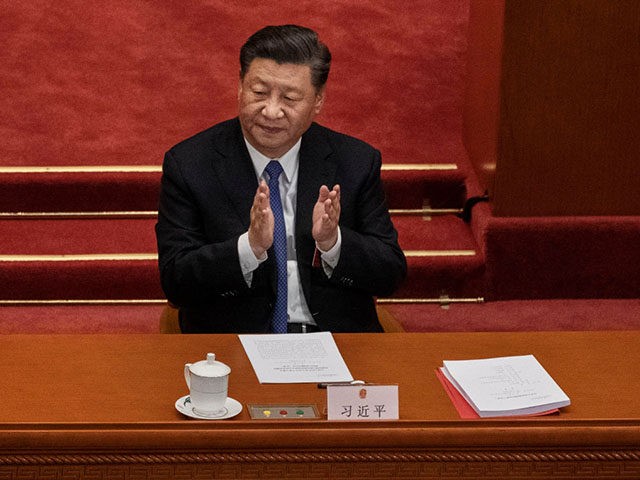A report published by Nikkei Asian Review (NAR) on Thursday asserted that Chinese dictator Xi Jinping is planning “another brutal purge” of his military leadership.
NAR asserted that Xi is reportedly displeased with the performance of the People’s Liberation Army (PLA) against Indian troops on the border, eager to consolidate more military power under his direct command, and nervous about political unrest to come in China.
Xi’s many titles include Chairman of the Central Military Commission — a position that makes him something of a hybrid between the civilian commander-in-chief of the armed forces, as American presidents are, and a top military officer like the Chairman of the Joint Chiefs of Staff. Xi has taken a hands-on management approach to the Chinese military before, notably in 2016 when he conducted a major reorganization that centralized military power and made a large percentage of top officers personally loyal to him. As with many of Xi’s power plays, this was supposed to reduce “corruption,” and did not.
According to NAR, an even bigger reorganization and purge could be in the works, driven partly by Xi’s desire to tighten his grip over the military — and militarize more of China’s police forces — before a prospective confrontation with the United States or another Tiananmen Square-style uprising.
In this analysis, Xi is pushing China to the brink of military confrontations in several theaters by personally taking a hand in provocative actions like the August 26 launch of “aircraft carrier killer” ballistic missiles into the South China Sea.
At the same time, Xi has been tightening control over internal security units by putting them under the direct control of the Communist Party instead of the government bureaucracy and its oversight committees. Xi is fond of cementing these power grabs by presenting each unit he takes control of with a brand new flag in a “pompous ceremony.”
Xi also likes to dispatch his deputies to give thinly-veiled warnings to unit commanders that Xi will punish them for insufficient personal devotion. The implication is that commanders who are not loyal enough are liable to be deemed “two-faced” and “corrupt,” which are serious and often terminal conditions in China.
NAR noticed that Xi has lately been pushing the concept of rectification in the civilian sphere, a term widely seen as the code name for a bloody Maoist purge. Getting rectified is not a pleasant experience. Xi’s campaigns to encourage more personal savings, and less “food waste,” are seen as signals that he is preparing to whip the Chinese people into shape for something big. The most pessimistic interpretation is that he is militarizing the entire population.
Another NAR post in June, written shortly after the bloody brawl between Indian and Chinese soldiers along the border in Ladakh, hinted that Xi did not expect his forces to get thrashed by the Indians in hand-to-hand combat — on the same day he was celebrating his 67th birthday! — and he was severely displeased by the resulting loss of “face.”
Xi clearly expected his extensively reorganized, centrally controlled military to perform better after years of “Wolf Warrior” propaganda, named after a series of highly successful military action films that began in 2015, and severely underestimated the Indians’ determination to stand their ground.
NAR suggested Xi is worried about overextending himself by provoking conflicts in too many theaters at once, from the Indian border to the South China Sea. China’s strategy is generally one of slow, patient encroachment and intimidation; it pushes its borders steadily outward, assuming its victims will not dare to object too strenuously, until one day announcing the territory it covets has now been fully garrisoned and is an eternal part of China. Intimidation is vital to making that strategy work.
The Epoch Times on Wednesday saw a “familiar pattern taking place in the Chinese leadership that ties back to Mao Zedong and his path to achieving absolute power over the party.” Another manifestation of this pattern could be seen in Chinese troops moving into Inner Mongolia to suppress protests that broke out this week, to the evident surprise of Xi and the rest of the Communist Party hierarchy.
The Mongolians are angered by Beijing’s attempt to eradicate their language and culture from school curricula, sensing the early stages of a “cultural genocide” campaign akin to what China is doing to the Uyghur Muslims of Xinjiang province. Xi has good reason to think he might need a freshly reorganized, purged, and even more loyal military to deal with minority populations who strenuously object to being erased.

COMMENTS
Please let us know if you're having issues with commenting.